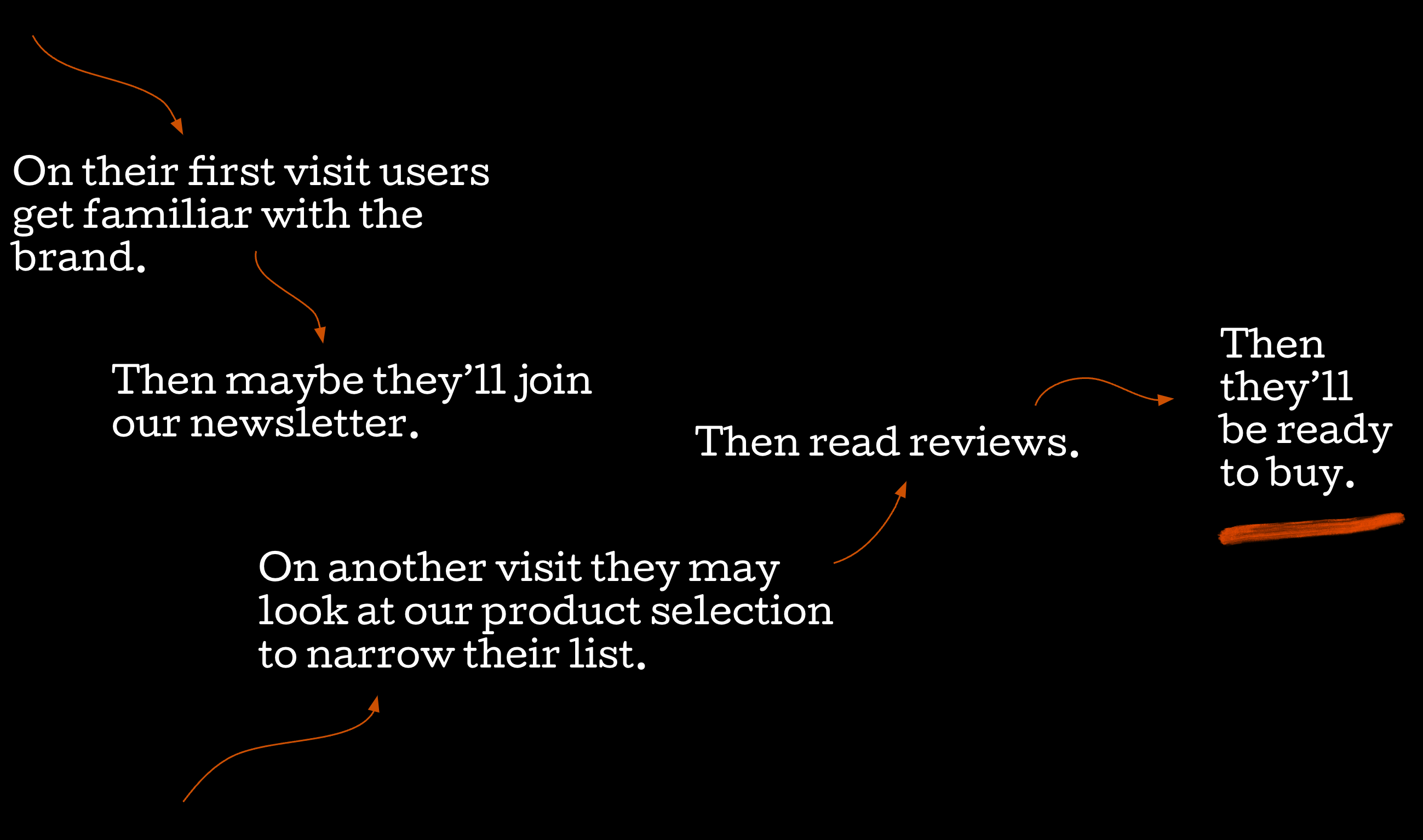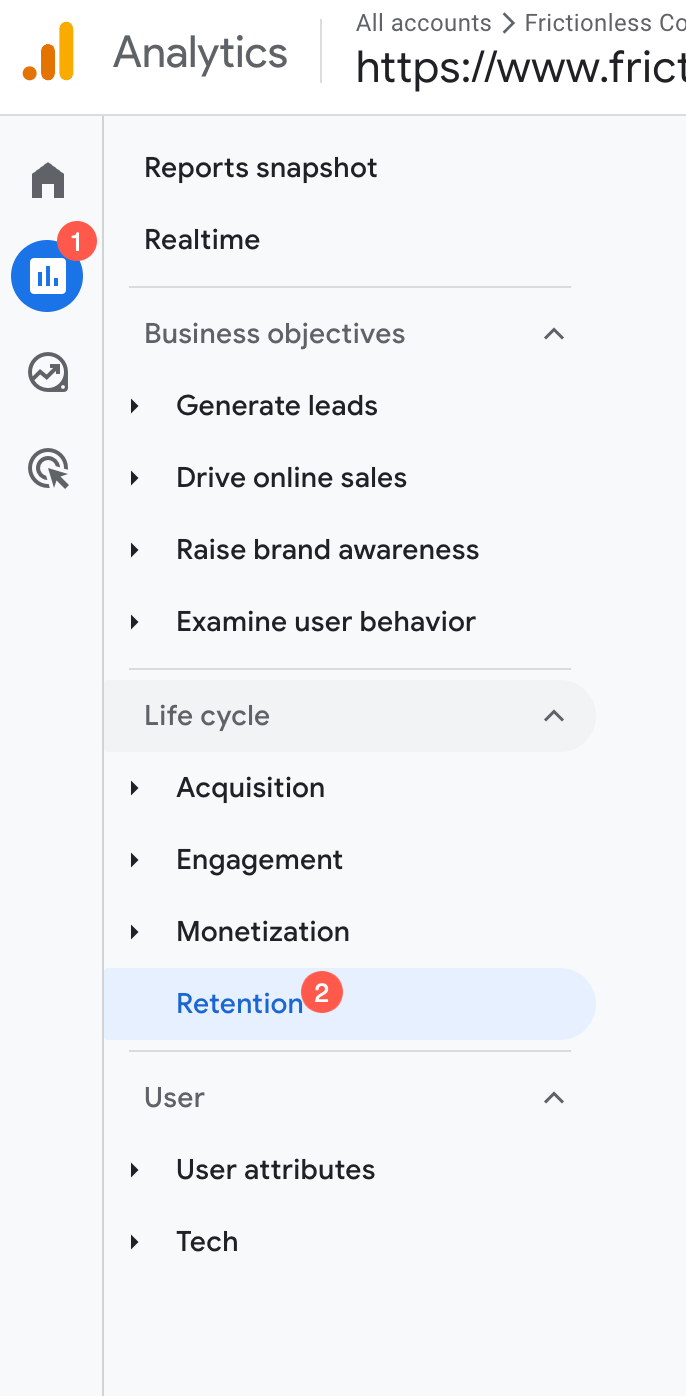Blog
How to Maximize Your Site’s First Visit Conversion Rate
How many chances do we get with site visitors?
When I talk to DTC brands, I typically hear something like, “Our buying cycle is long. The buyer needs more than one visit.”
When I talk to marketers, they say, “We have to touch visitors multiple times before they buy.”

Is this true? I don’t see evidence to support it.
When I look at GA data, I see that 80% of visitors are new.
Don’t take my word for it; go to your Google Analytics, pick a six-month time period, and make these two selections (1 and 2 in the screenshot below):

It’ll show how many visitors are new and how many are returning.
Divide the “Returning Users” number by the “New Users” + “Returning Users” number to see your overall return visitor rate.
Why First Visit Conversion Rate Matters
Operating under the assumption that we have multiple chances to convert changes how we market.
Knowing we have multiple opportunities, we may be more tempted to add people to our mailing list because we know the buyer needs more time. It can also relax the vibe of our site content and layout.
That’s why we put reviews at the bottom of the page. “It’s OK; what’s the hurry? If visitors don’t see reviews immediately, they’ll join our mailing list and eventually find and read them.”
Contrast this with how we’d behave knowing this was the first and only visit.
What You Shouldn’t Do
Knowing we have one shot doesn’t mean we should hard sell or give discounts. That’s not what I’m saying.
But this realization does focus one’s conversion attention.

Realizing the importance of first visit conversion rate forces prioritizing.
Over time, our sites accumulate a lot of unnecessary stuff.
It’s wise to remember every word is an attention tax.
There are core aspects of your sales pitch aspects, and there are nice-to-have ones.
Ditch the nice-to-have ones to double down on the core ones.
Make a clean argument for why visitors should end their search and buy your solution today.
Keep A/B testing your core argument until you’ve found the one with the biggest first-visit impact.
The Tide That Raises All Boats
By becoming efficient at managing the first visit, not only are we improving the chances of a purchase on this visit, we’re also giving those not ready to buy today a compelling reason to join your mailing list and respond to our retargeting ads.
Where are all these extra conversions (purchases, email signups, purchases via retargeted ads) coming from? From the massive pool of visitors who were previously leaving without taking any action.
Are You a Marketer?
I assume you are because a subject like first visit conversion rates could only appeal to a marketer.
And if you are a marketer and liked this article, boy, do I have something fun for you.
Revealing It All
In our marketing lab 🥼, experimenting 🧪 for the last 15 years, we’ve discovered that one reason marketing campaigns fail is because they try to do too much.
Once they’ve consumed your pitch, prospects can be placed in 1 of 3 groups:
— Ready to buy
— Will never buy
— Interested, but need a little more convincing
The 3rd group has the biggest revenue potential.
Evidence Our Formula Works
This strategy mentioned above isn’t a theoretical framework. It’s the base formula for all our conversion work for clients. This marketing framework can be used to boost sales for sports products. To sell skincare products. Pet products. Consumer electronics. Athletic gear. Back pain solutions. Food items. High-end cooking tools.
Does the sales pitch always need to be shown as a popup? Nope.
It can also convert cold Facebook ad traffic, improve mobile conversion rates, generate calls, optimize your most important landing page, etc.
It can even be used to improve your overall conversion rates.
Converting Interested, but Need a Little More Convincing Group (With Examples)
Explained in this nine truths article.



